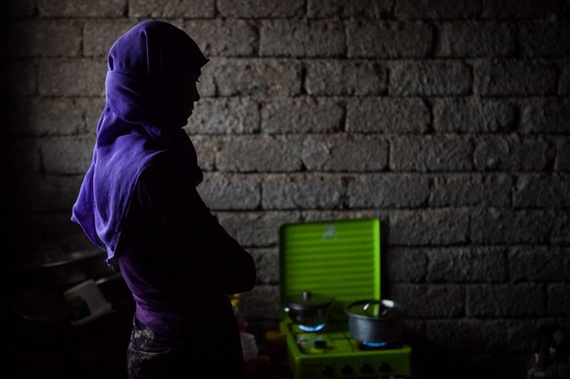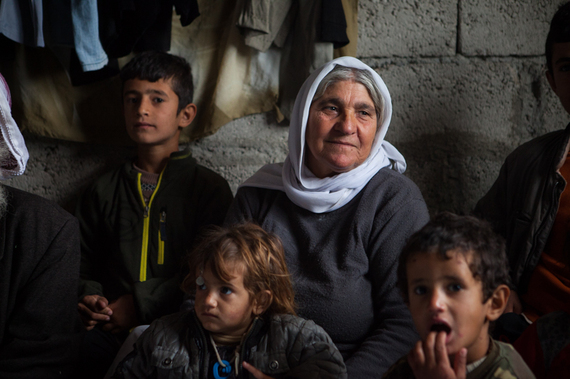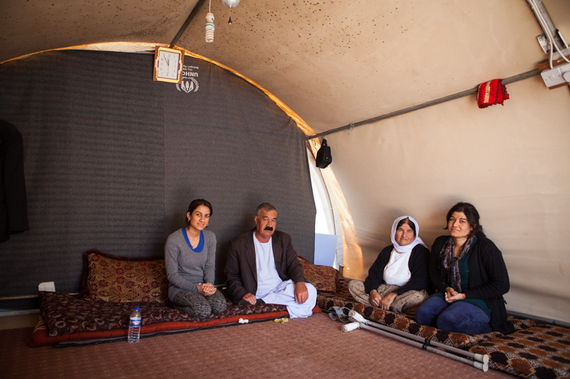
Most Syrians forced from their homes dream not of going to Europe or Canada, but back home. And Canada's military involvement in the region is not improving their chances. That is the message a Canadian aid agency is conveying from its partners in Syria and surrounding countries.
The Winnipeg-based Mennonite Central Committee has 60 years of experience on the ground in the Middle East and currently works with over 25 local civil society partners in Syria and neighboring Iraq, Lebanon and Jordan. It has spent over $47 million to address the Syria-Iraq crisis over the past five years.

Savay, whose last name is withheld for security reasons, cooks rice in an unfinished home shared by 10 families affected by the Syria-Iraq crisis. (MCC Photo/Matthew Sawatzky)
The agency's representatives for Syria and Lebanon, who cannot be named for security reasons, work directly with partner organizations in some of the hardest hit areas of Syria as well as with refugees who have fled places like the defacto ISIS capital of Raqqa.
While many media reports portray Syria as little more than a place from which to flee, MCC works with people who long to return, people who refuse to leave, and people who do not want their home towns shelled beyond recognition.
Speaking via skype from the region, MCC staff say of their local partners, "they are in love with their country." They tell of a bishop in the ravaged city of Homs who presides over a church that was founded in 47 AD. He is not leaving.
In Aleppo, another one of the most chaotic cities, MCC staff say electricity is "pretty well non-existent" and water flows once a month if residents are lucky. For many people, their days consist largely of dodging sniper fire to get water and food. On a very good day in Aleppo, people may be able to have a family picnic at one of the parks that is still suitable for such purposes. The recent cease-fire has made this more possible.
In that barren context, MCC used funds provided by Canada's Office for Religious Freedom to support a theatre project that saw over 1,200 people from a range of Christian and Muslim sects literally dodge bullets to attend a play about a love story that crosses traditional boundaries.
MCC staff say it is the "amazingly resilient" people like the bishop in Homs and the theatre organizers in Aleppo "who will rebuild the country."
Though half of Syrians have been forced from their homes--4.6 million have fled the country while another 6.6 million are displaced internally--it is clear that there are many people who have not given up on Syria. Indeed, some who have made Canada "home," still dream of their other home.

Qasim (8), Tawaf (5), Hatay (61) and Murad (6) fled from the Islamic State group and have taken refuge in an unfinished house in a small town in northern Ninewa governorate, Iraq. (MCC Photo/Matthew Sawatzky)
MCC staff recount the story of the father of a Syrian refugee family in Lebanon, who, driven by desperation, was prepared to put his family in a dingy headed for Europe. His wife was reluctant. That's understandable; since Aylan Kurdi's body washed up on shore last September, at least 340 children have drown in the Mediterranean according to the U.N. Through an MCC partner, the family debating the voyage to Europe obtained food vouchers that made the difference between heading out to sea and staying on dry ground.
In many cases, aid for refugees sustains them while they await the chance to go home. While MCC's partners in the region are deeply grateful for the willingness of countries like Canada to welcome refugees--and MCC is also very active in refugee resettlement in Canada--they say the primary need is in the region itself. People don't want to have to leave.

Feryal (left) (22), her parents Elyas and Fatima and her sister Jandar, whose last names are withheld for security reasons, live in a tent at a camp for internally displaced persons in northern Ninewa governorate, Iraq. (MCC Photo/Matthew Sawatzky)
Canada has pledged $1.1 billion in aid to the region over three years. In a letter to Prime Minister Trudeau, MCC praised that commitment. At the same time, the letter says MCC is "deeply concerned" about Canada's ongoing anti-ISIS military involvement, including its reconnaissance and refueling assistance for air strikes.
"Our . . . partners have reported," the letter states, "that as coalition airstrikes attempt to retake cities from ISIS not only do they cause immeasurable harm to civilians, but they demolish vital health, sanitation, and educational infrastructure. . . leaving cities virtually uninhabitable and fueling massive displacement." Partners are also concerned about provision of weapons, which they say do not always stay in the right hands.
Rooted in the Mennonite pacifist tradition, MCC urged Canada to focus instead on humanitarian and diplomatic efforts which contribute to what its partners see as the only solution: "a comprehensive political process in Syria, strengthening inclusive governance in Iraq, supporting peacebuilding initiatives that prevent religious and sectarian violence, and investing in humanitarian measures that build regional resilience."
That, they believe, is the path to the future that so many still believe in.
A version of this article first appeared in Canadian Mennonite magazine. Braun worked for MCC on unrelated matters from 1998 to 2002.